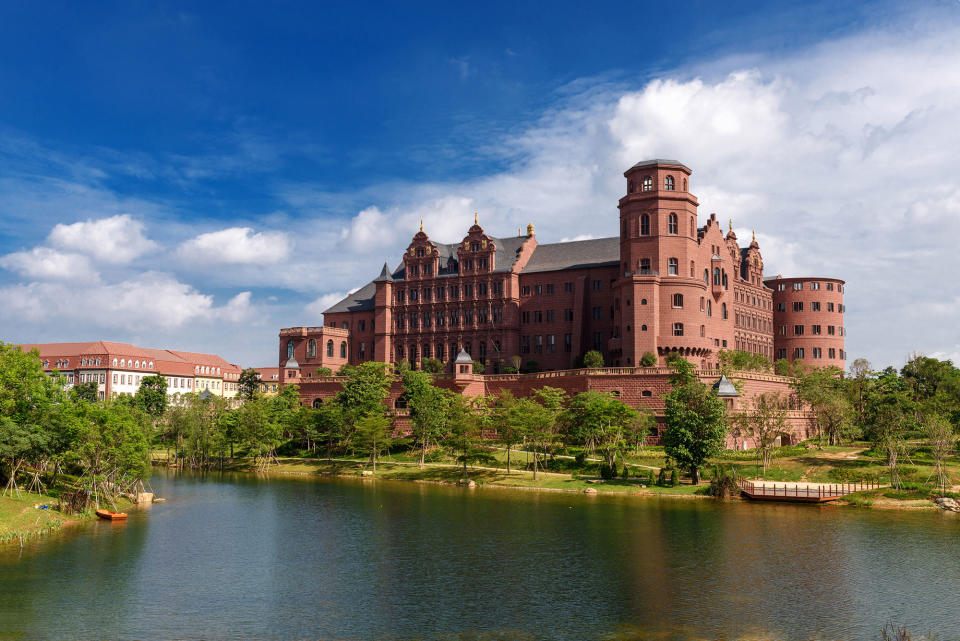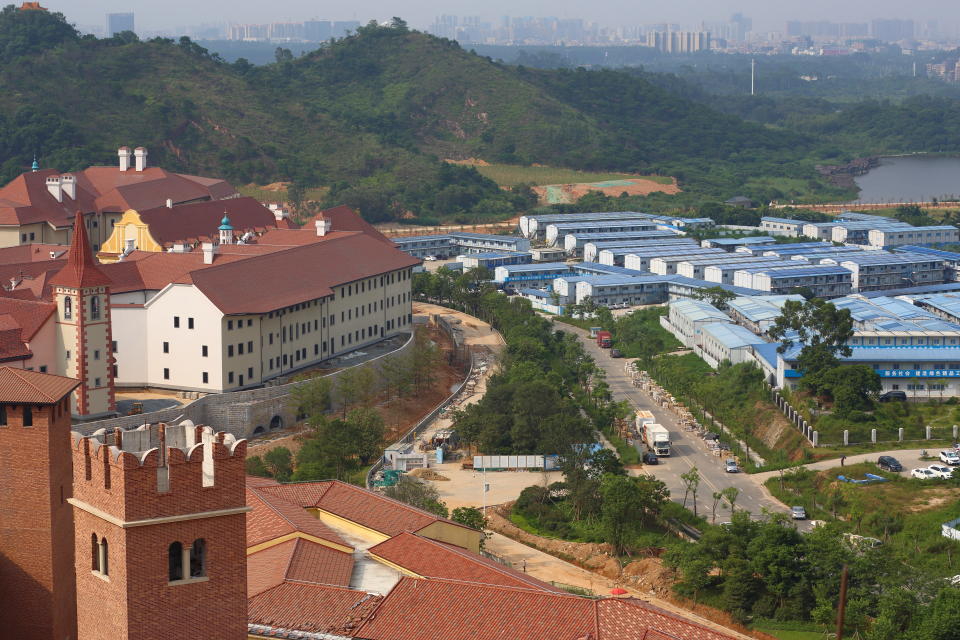Inside Huawei’s $1.5 billion ‘European town’ campus in China
Dongguan, a southern city of China, is home to Huawei’s R&D center, the brains of the Chinese tech giant, which has been caught in the crosshairs of the U.S.-China trade battle.
Ox Horn campus is the center’s official English name, but employees call it Xi Cun “Stream village” or “European town.” The sprawling 296-acre site features 12 areas modeled after various European towns and a man-made lake. An old-fashioned red train, imported from Switzerland, runs through the campus to transport employees. On campus, there is a castle from Luxembourg, a palace resembling the Palace of Versailles in France, and a tower inspired by the Czech Republic.
The campus houses the R&D team representing the crown jewel of China’s tech advancement, but its design barely has any trace of Chinese culture. The construction of the campus, a barren wasteland turned European-style theme park, took over five years to build and costs 10 billion yuan ($1.45 billion). Today 18,000 R&D staff work there. When the rest of the campus, one-third of it, is finished, it will eventually be home to 25,000 employees.
When the campus first opened in July 2018, it generated some criticism on China’s social media for copying other cultures while ignoring its own. Now that Huawei faces increasing pressure from the U.S. government for national security concerns, the company has become China’s national pride.

When asked about the campus’s architecture, Huawei CEO and founder Ren Zhengfei said it’s all about beauty. He is known for his taste and preference for European culture and style. Even Huawei’s employee forum is named Roman Forum. Ren wants his company to be Western, not just in its appearance.
“When you are here, you might notice that Huawei is not like a Chinese company at all. Except for our canteens and all the Chinese faces, it's more like a Western company,” he told Yahoo Finance in an exclusive interview. “We have absorbed the good, advanced elements of Western culture. Isn't our corporate culture like Protestant culture?”
On a mid-July weekday, the campus is quiet. Employees get off from the shuttle bus, which is provided by Huawei and makes multiple stops in adjacent cities, at about 8:30 a.m., and walk through the passages to get into their European-style offices. Canteens can be found on the ground floor of every office building. Food and beverages are not free, but they are slightly cheaper than the market price and there are lots of options. When employees stay late, which is quite common, they can get free snacks at the 7-Eleven convenience stores located on campus.
Outside the European-style campus, Huawei is constructing about 30,000 apartments for Huawei employees. The apartments will be offered to employees at a price that is less than half the market rate — a huge perk in China, where young people are increasingly finding apartments in cities unaffordable.
Huawei in crisis mode

Beneath the campus’s calm exterior, Huawei has been going through one of the biggest crises since its founding in 1987: The U.S. government is going after the company for national security concerns and violating sanctions, amid a year-long trade feud with China.
Ren believes his tech empire has been holding up well under the pressure, despite initially not being prepared to be placed on the U.S. Department of Commerce’s Entity List, which effectively bans Huawei from doing business with U.S. companies. “We will not stop production for even one day,” Ren told Yahoo Finance.
Ren tries to downplay the impact of the move and emphasizes the bright side, although he estimates a $30 billion revenue growth cut this year.
“The Entity List has injected a sense of crisis in our employees, and inspired passion across the company. This has provided an opportunity for us to reposition underperforming managers and replace them with outstanding young employees,” said Ren. “The U.S. is now chasing us like a wolf, so we have to start running.”
Huawei has quickly defended itself by using its own chips and switching to components from non-U.S. companies. Employees are required to list components and suppliers to review whether they are subject to the U.S. ban. Even the service department has launched its “wartime plan” to provide meals and commutes on weekends and holidays. Huawei is also working closely with American tech companies like Google and Intel to try to resume supply.
Across the sea, it laid off over 600 researchers in its U.S. R&D research arm Futurewei. In Europe, a major market for the company, Huawei launched a marketing campaign to reverse the dropping demand for smartphones caused by the fear of Huawei losing Google’s Android system on its phones. In an internal notice, employees are told not to talk to families and friends about their supply chain and project schedules.
Li Pengfei, a senior thermal engineer at Huawei, has seen a negative impact on his own work. Li, who earned a doctoral degree in the U.S., had to cut research ties with American universities due to increasing distrust.
“I have to have a sense that which technology is sensitive to the U.S. government before I develop technology, that really gives me a boundary on my research,” said Li. “I don’t want to be a target.”
Ren is now in the public eye

To Huawei employees, one thing they need to get used to is seeing their 74-year-old, typically low-key and private boss in the public eye more often. Ren, a former engineer in the military, rarely granted media interviews until November 2018.
Ren’s daughter Meng Wanzhou, who is the company CFO, was arrested in Canada and faces extraditions to the U.S. for alleged violations of Iran sanctions. Since then, Ren has frequently spoken up, about his company and even his personal life, as the company quickly learned that burying its head in the sand does not work. So, Huawei shifted its PR strategy. The company even published a book that compiled all of the interviews Ren has conducted in both Chinese and English, and is working on translating the book into five others languages. But the company sometimes intentionally omitted some juicy statements made by Ren.
The book, along with other books about the 32-year-old company’s history, is on the shelves in a cafeteria on campus. The cafeteria, inside the building known as the “Paris” train station, is named Cafe de Flore. The bestseller, however, is not one about Huawei. It’s a translated copy of “The American Trap,” written by a former Alstom executive Frédéric Pierucci, who spent two years in a U.S. prison for his role in a bribery scandal. The book has been promoted as a story that is the “French version of the Huawei incident,” with Pierucci seen as a victim.
Li Li, a 13-year veteran in the R&D department at Huawei, said he watched Ren’s interviews and found the U.S.’s actions against the company “inconceivable”.
“From what we feel, we’re just a company that works really hard, including all of our employees. We don’t know why the U.S. would make such a move against us,” said Li. “They’re trying to protect American companies, that’s how we feel.”
Krystal Hu covers technology and China for Yahoo Finance. Follow her on Twitter.
Read more:
Huawei CEO on partnerships with U.S. companies: 'We have to be more cautious"
Huawei sets aggressive goal of 270 million phone shipments despite US ban: Exclusive
Follow Yahoo Finance on Twitter, Facebook, Instagram, Flipboard, SmartNews, LinkedIn, YouTube, and reddit.



